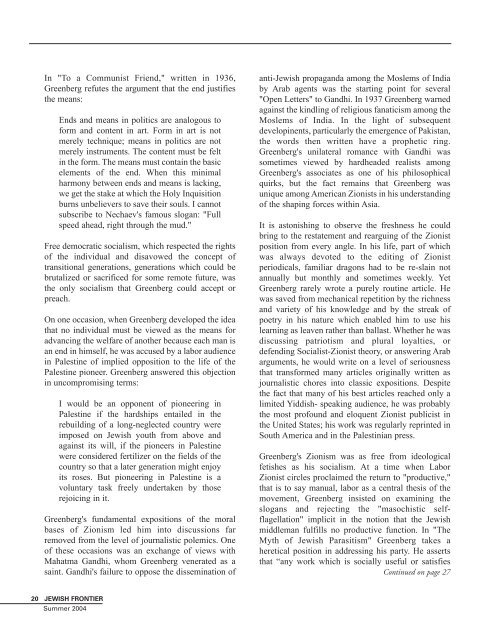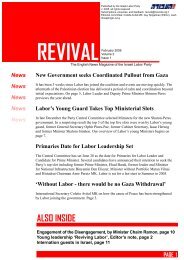Create successful ePaper yourself
Turn your PDF publications into a flip-book with our unique Google optimized e-Paper software.
In "To a Communist Friend," written in 1936,<br />
Greenberg refutes the argument that the end justifies<br />
the means:<br />
Ends and means in politics are analogous to<br />
form and content in art. Form in art is not<br />
merely technique; means in politics are not<br />
merely instruments. The content must be felt<br />
in the form. The means must contain the basic<br />
elements of the end. When this minimal<br />
harmony between ends and means is lacking,<br />
we get the stake at which the Holy Inquisition<br />
burns unbelievers to save their souls. I cannot<br />
subscribe to Nechaev's famous slogan: "Full<br />
speed ahead, right through the mud."<br />
Free democratic socialism, which respected the rights<br />
of the individual and disavowed the concept of<br />
transitional generations, generations which could be<br />
brutalized or sacrificed for some remote future, was<br />
the only socialism that Greenberg could accept or<br />
preach.<br />
On one occasion, when Greenberg developed the idea<br />
that no individual must be viewed as the means for<br />
advancing the welfare of another because each man is<br />
an end in himself, he was accused by a labor audience<br />
in Palestine of implied opposition to the life of the<br />
Palestine pioneer. Greenberg answered this objection<br />
in uncompromising terms:<br />
I would be an opponent of pioneering in<br />
Palestine if the hardships entailed in the<br />
rebuilding of a long-neglected country were<br />
imposed on Jewish youth from above and<br />
against its will, if the pioneers in Palestine<br />
were considered fertilizer on the fields of the<br />
country so that a later generation might enjoy<br />
its roses. But pioneering in Palestine is a<br />
voluntary task freely undertaken by those<br />
rejoicing in it.<br />
Greenberg's fundamental expositions of the moral<br />
bases of Zionism led him into discussions far<br />
removed from the level of journalistic polemics. One<br />
of these occasions was an exchange of views with<br />
Mahatma Gandhi, whom Greenberg venerated as a<br />
saint. Gandhi's failure to oppose the dissemination of<br />
anti-Jewish propaganda among the Moslems of India<br />
by Arab agents was the starting point for several<br />
"Open Letters" to Gandhi. In 1937 Greenberg warned<br />
against the kindling of religious fanaticism among the<br />
Moslems of India. In the light of subsequent<br />
developinents, particularly the emergence of Pakistan,<br />
the words then written have a prophetic ring.<br />
Greenberg's unilateral romance with Gandhi was<br />
sometimes viewed by hardheaded realists among<br />
Greenberg's associates as one of his philosophical<br />
quirks, but the fact remains that Greenberg was<br />
unique among American Zionists in his understanding<br />
of the shaping forces within Asia.<br />
It is astonishing to observe the freshness he could<br />
bring to the restatement and rearguing of the Zionist<br />
position from every angle. In his life, part of which<br />
was always devoted to the editing of Zionist<br />
periodicals, familiar dragons had to be re-slain not<br />
annually but monthly and sometimes weekly. Yet<br />
Greenberg rarely wrote a purely routine article. He<br />
was saved from mechanical repetition by the richness<br />
and variety of his knowledge and by the streak of<br />
poetry in his nature which enabled him to use his<br />
learning as leaven rather than ballast. Whether he was<br />
discussing patriotism and plural loyalties, or<br />
defending Socialist-Zionist theory, or answering Arab<br />
arguments, he would write on a level of seriousness<br />
that transformed many articles originally written as<br />
journalistic chores into classic expositions. Despite<br />
the fact that many of his best articles reached only a<br />
limited Yiddish- speaking audience, he was probably<br />
the most profound and eloquent Zionist publicist in<br />
the United States; his work was regularly reprinted in<br />
South America and in the Palestinian press.<br />
Greenberg's Zionism was as free from ideological<br />
fetishes as his socialism. At a time when Labor<br />
Zionist circles proclaimed the return to "productive,"<br />
that is to say manual, labor as a central thesis of the<br />
movement, Greenberg insisted on examining the<br />
slogans and rejecting the "masochistic selfflagellation"<br />
implicit in the notion that the Jewish<br />
middleman fulfills no productive function. In "The<br />
Myth of Jewish Parasitism" Greenberg takes a<br />
heretical position in addressing his party. He asserts<br />
that “any work which is socially useful or satisfies<br />
Continued on page 27<br />
20 JEWISH FRONTIER<br />
Summer 2004




